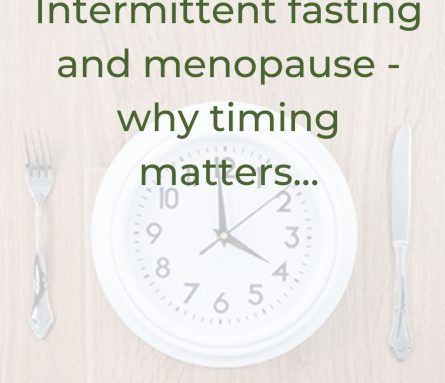One of the common questions I hear from women navigating menopause is: Can intermittent fasting (IF) help with managing weight, energy, and symptoms?
Firstly, let’s define what we mean by IF – one of the most common routines is 16:8, which is fasting for 16 hours including the overnight period when you’re asleep and eating during an 8-hour window.
But is this beneficial for women? Especially when most of the research is done on men!
The answer is it depends, because we are all genetically different, however the limited evidence that is available suggest it may not be helpful and it really does come down to timing..
Instead of the classic approach of skipping breakfast and eating later in the day, shifting your eating window earlier (say, 8am - 4pm or 9am - 5pm) can be far more effective, especially for women in menopause.
Here’s why:
1️⃣ Optimises Metabolism: Eating earlier aligns better with your body’s natural circadian rhythm, improving insulin sensitivity and energy levels. This can help combat that stubborn menopausal weight gain.
OIF
2️⃣ Supports Hormone Balance: During menopause, hormone fluctuations can cause fatigue, hot flashes, and mood swings. IF helps stabilise cortisol levels, which can reduce stress and improve overall mood.
3️⃣ Boosts Sleep Quality: Late-night eating can interfere with sleep, especially if you're already dealing with night sweats or insomnia. Finishing eating your meals earlier in the day allows your digestive system to rest, promoting deeper, more restful sleep.
However it does depend on the quality of your diet and ensuring you getting sufficient protein at every meal, including breakfast, as well as a wide range of vegetables and fruits and not skimping on the healthy fats.
How to Get Started:
👉 If you’re new to intermittent fasting, try starting with a 12-hour eating window (e.g. 7am - 7pm) and gradually shorten it as your body adjusts and if it suits you. Focus on nutrient-dense, protein-rich breakfasts like eggs, or Greek yoghurt, berries & nuts/seeds to kickstart your day and help keep blood sugar levels stable throughout your eating window.
Remember: It’s not just about when you eat, but how you feel. The goal is to support your body through this transition, not to stress it further. Always listen to your body's signals and adjust as needed!

